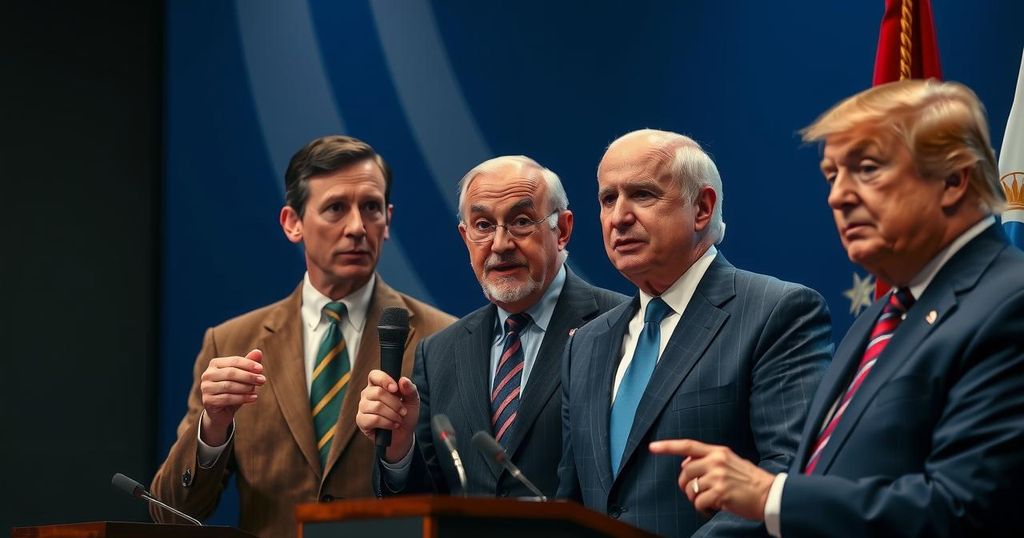Moscow and Putin: A Cautious Outlook on a Potential Second Trump Term
The article explores Russia’s evolving sentiments towards the United States following Donald Trump’s presidency. In 2016, there was enthusiasm for improved relations, but Trump’s later sanctions led to disappointment. As he campaigns for a second term, Russian officials are more cautious given recent tensions over Ukraine. Insights from Muscovites reveal diverse opinions on American politics, with some favoring Trump and voicing hopes for peace, while others harbor grievances against the US.
In the wake of Donald Trump’s election to the presidency in 2016, many in Russia expressed overwhelming optimism regarding the potential for improved US-Russian relations. High-profile figures, such as Vladimir Zhirinovsky, celebrated this victory with exuberant gestures, including purchasing large quantities of champagne. However, the expected thaw in relations did not materialize as anticipated; instead, Trump’s administration imposed significant sanctions on Russia. By the conclusion of his term, many Russian officials felt disappointed, learning a valuable lesson about the unpredictability of international politics—”the heaviest sanctions against Russia at that time” were implemented under his watch, which was a stark contrast to the initial hopes held for his presidency. As Trump campaigns for a second term, the Kremlin appears more circumspect. President Vladimir Putin, who once seemed to support Trump, has now made ambiguous remarks seemingly directed at the Democratic candidate, Kamala Harris, which have been interpreted by some as a form of mockery. Trump’s platform, characterized by criticisms of US military assistance to Ukraine and his reluctance to directly condemn Putin for his actions, is seen as potentially favorable from the Kremlin’s perspective. Conversely, Harris has condemned Putin’s militaristic actions and emphasized the United States’ strategic interests in supporting Ukraine, further complicating Russia’s sentiments towards the current US administration. The Kremlin might also benefit from a contentious electoral process in the US, one that could distract the nation from its foreign policy concerns, including the ongoing conflict in Ukraine. US–Russian relations have deteriorated markedly during the presidency of Joe Biden, following further sanctions and military support rendered to Ukraine after Russia’s aggressive incursions into its territory. As I sought the opinions of Muscovites regarding their perspectives on the United States, responses varied significantly. Some expressed longstanding grievances against US foreign policy, while others voiced a desire for peace and friendship, indicating a nuanced view towards American politics and society. A notable perspective came from an individual who stated, “Our countries and our two peoples should be friends, without wars and without competing to see who has more missiles. I prefer Trump. When he was president there weren’t any big wars.” The article concludes with a reflection on the potential for leadership change in both nations, expressing hope for future political developments, particularly regarding the potential election of women to the highest offices, which could usher in a new era in US-Russian relations. The insights gleaned from this exploratory journey illustrate the complex tapestry of emotions and viewpoints surrounding the impending 2024 election, highlighting the intricate interplay between Russian and American geopolitical dynamics.
The article examines the evolution of Russian attitudes toward the United States, particularly in light of Donald Trump’s presidency. Following his unexpected victory in 2016, there was a remarkable surge of optimism in Russia regarding prospects for collaboration and improved relations. This initial enthusiasm has been tempered by subsequent policies that imposed sanctions against the Russian state under Trump’s administration and the overall deterioration of US–Russian relations under successive presidencies. This piece contextualizes the shifting political landscape and the uncertain reception of a potential second Trump term, particularly in relation to current Ukrainian tensions and internal US electoral dynamics.
In conclusion, Russia’s initial enthusiasm regarding Donald Trump’s presidency has been replaced by a more cautious approach in anticipation of the upcoming election. While there is some recognition of the favorable aspects of Trump’s rhetoric towards Russia, the overall reality of US foreign policy remains contentious. Additionally, the varied opinions from the Russian public signal a complex relationship between the nations—one that intertwines historical grievances with a yearning for peace and friendship. As the 2024 election approaches, the outcomes and implications for US-Russian relations remain to be seen.
Original Source: www.bbc.com




Post Comment